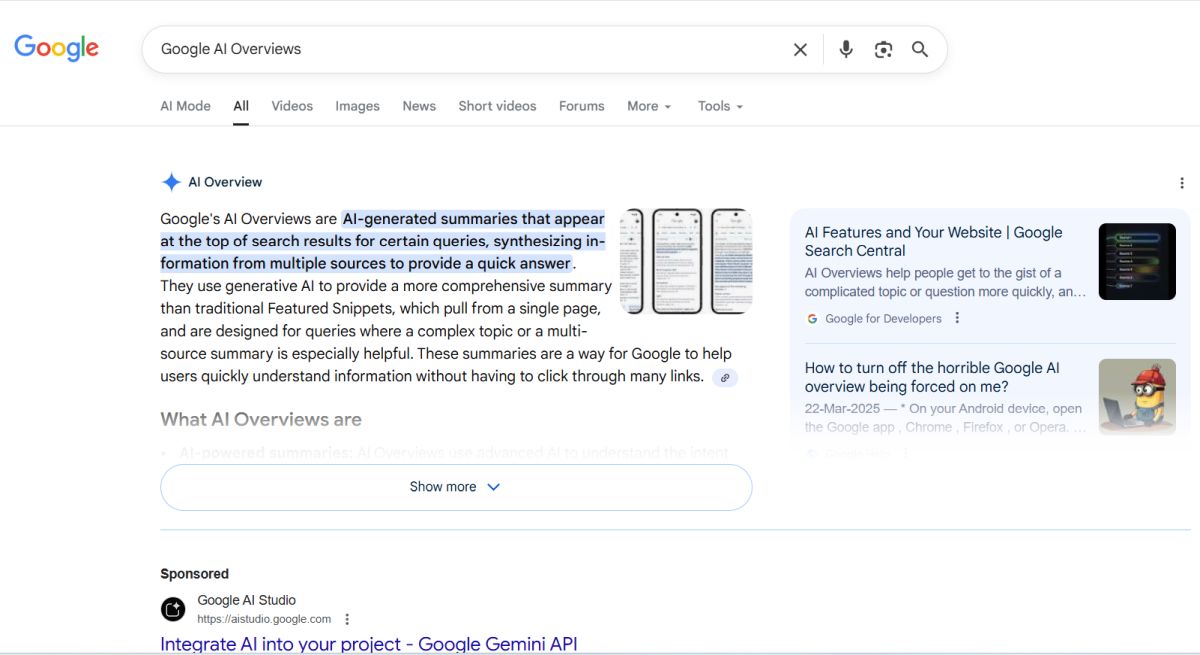If you’ve searched a question lately and found a compact, conversational answer above the usual blue links, you’ve met Google AI Overviews. They’re Google’s AI-generated snapshots that synthesize key facts from across the web and then point you to supporting sources so you can dig deeper. In short, they do some reading for you, then let you continue the journey with links.
How AI Overviews Work
At a high level, Google’s systems analyze your query, gather relevant information from multiple web pages, and generate a concise summary that directly answers the question. The summaries appear at the top of the results page, often called “position zero,” followed by links to the pages that informed the answer. Think of them as an expanded featured snippet that references multiple sources rather than just one.
Google positions AI Overviews as a way to “get to the gist” quickly for complex questions while encouraging exploration via source links. The company also says the feature shows up where it provides clear added value beyond traditional results.
Where Are They Available
Google began rolling out AI Overviews widely in May 2024, starting in the U.S. Google says the feature will reach over a billion users by year’s end. It is currently available in 200 countries and territories across 40 languages and is expanding.
Why People Care: Speed, Context, and Transparency
For searchers, the upside is obvious: faster, more precise answers for multi-part or unfamiliar topics, plus direct links to the underlying sources. That blend of speed plus citations can make the search process feel more like a mini-research assistant than a list of links. Google emphasizes that Overviews are designed to help you start with a summary and continue with deeper reading via the web pages they reference.
Why Publishers and SEOs Care: Visibility and Traffic
AI Overviews sit above organic results; they can influence what gets seen and clicked. Industry studies and commentary suggest that Overviews may change click-through patterns on many queries, sparking debate about how traffic is distributed and whether smaller sites lose visibility when the summary answers the question up front. Regulators and news publishers in parts of Europe have even raised concerns about competition and traffic impacts as AI features become central to search. Google argues that Overviews can widen discovery by sending users to multiple sources.

What AI Overviews Mean for Your Content Strategy
| Action | Why It Matters | How to Implement | How to Measure |
| Structure for answers | Clear, scannable sections help AI extract accurate summaries. | Use H2/H3, definition boxes, and FAQs; answer “what/how/why” in the first 100–150 words. | Featured snippet wins, AI Overview citations, and reduced pogo-sticking. |
| Cite your own claims | Evidence boosts trust and selection for summaries. | Add primary data, standards, and footnotes; link to sources. | Backlink growth, mentions in AI Overviews, and E-E-A-T signals in audits. |
| Cover depth and nuance | Overviews are short; your page must deliver the full picture. | Include edge cases, step-by-steps, decision trees, and visuals. | Time on page, scroll depth, and assisted conversions. |
| Technical SEO excellence | If Google can’t crawl it, it won’t surface it. | Fix indexation, CWV, and internal links; keep sitemaps clean. | Core Web Vitals, crawl stats, and indexed page trends. |
| Optimize for questions | Many Overview queries are multi-step/intent. | Map intents; build FAQ hubs and tasks and flows (compare/choose/fix). | Impressions and CTR on question queries, AI Overview visibility. |
| Answer Engine Optimization | Visibility extends beyond blue links. | Track where you’re cited; publish authoritative, structured content. | Share of voice in AI answers, referral mix from cited pages. |
Will AI Overviews Replace Clicks
Not entirely. Overviews are designed to provide an entry point, not a destination. When users need step-by-step instructions, comprehensive comparisons, or specialized details, they still click through often to multiple sources. Google has publicly stated that these features can increase the diversity of websites people visit for complex questions, though experiences will vary by query type and competition.

Practical Checklist to Get Started
- Audit your “question” coverage: Identify consumer inquiries and ensure you’ve published high-quality, up-to-date answers.
- Narrow entity clarity: Use precise naming, definitions, and schema to help systems understand who you are and what you offer.
- Show your work: Add citations, original data, or demonstrations that make your content the source others summarize.
- Maintain technical health: Fix crawl errors, thin pages, and slow templates that undercut eligibility for any SERP feature.
Conclusion
Google AI Overviews are a new front door to the web: fast, contextual, and increasingly common across countries and languages. This won’t end organic search, but it will reshape how answers surface and which pages earn the follow-up click. Brands that publish clear, credible, technically sound content will be best positioned to appear in Overviews and win the true audience retention. Treat AI Overviews as a visibility opportunity, then build pages worth exploring once the snapshot piques users’ curiosity.





